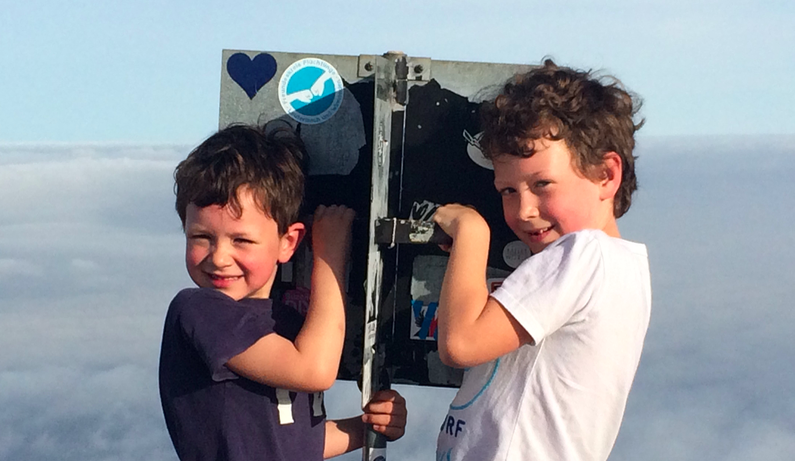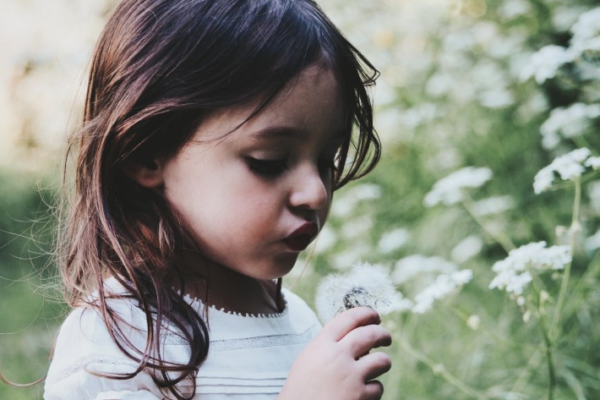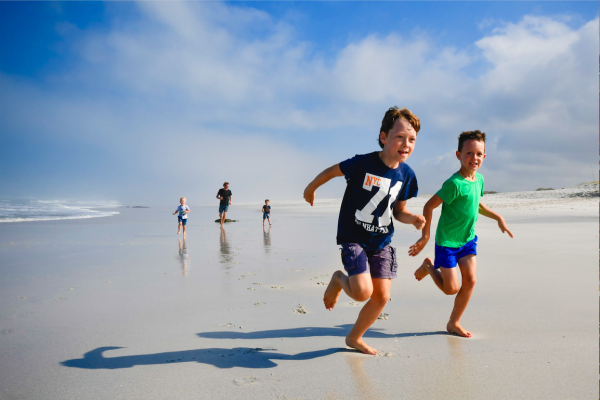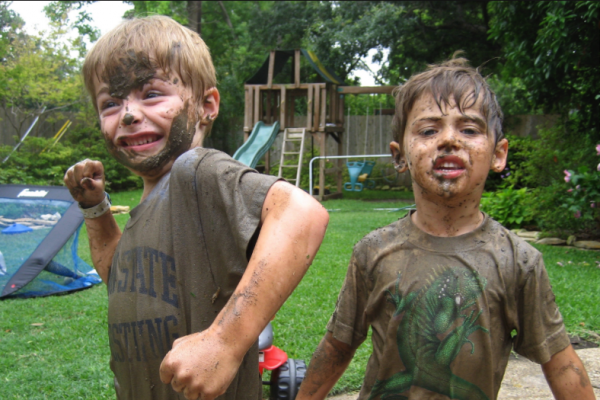
8 Invaluable Life-lessons To Teach Our Kids (And To Live By Yourself)
I believe that, for boys especially but girls too, the best classroom is outdoor adventure.
Adventures serve up many teachable moments. That’s because they are a microcosm of life – the kinds of things that go wrong or come up mid-adventure are the kinds of things that do so in the decades of life.
Adventures also adrenalize the brain, which is in high alert to the newness of the experience – thus making kids as impressionable as Play-doh. When there is real danger or challenge as part of the adventure, then dad or mom or whoever the guide is, is now held in the highest esteem. We are poised to provide life-equipping commentary as the events unfold, knowing that what you say will likely stick 10 times more adhesively than a classroom lesson ever could.
Recently, I took Eli (8) and Fynn (6) up Lion’s Head in Cape Town to see the gorgeous sunrise from its zenith. My stated goal: to push their psyches and bodies to a new level, in the face of real danger. My secret goal: to capitalise on my Edmund Hillary-like status in their eyes, and teach them some things about life as opportunities naturally arose.
What struck me most was just how many teachable moments presented themselves in those 2 and half hours of ascent and descent. On reflection, I remember teaching my kids 8 bits of life-wisdom on the path, each lesson applicable to the many challenges that life will set before them in the months, years and decades to come. Here they are…
1. A lesson in TRAINING
You have to patiently prepare before you can go to new heights.
A few weeks ago, preparing them for this climb, I explained to my boys that I learned to handstand in several stages. First head-stands against a wall. Then head-stands without a wall. Then hand-stands against a wall. Then hand-stands without a wall.
I couldn’t have gone straight to the hand-stand, I pontificated, and neither can you go straight up that mountain. You have to do a lot of training. Like riding your bikes, climbing trees and play-fighting. Lots and lots of that stuff. Only then will you be fit enough to summit that mountain. You have to get those leg muscles strong, and your heart and lungs fit.’
My boys turned into Duracell bunnies in the days before, as they prepared for the big day. In hindsight, I realise they took to the principle of progressive preparation intuitively. Driving home, they asked, Dad, now that we have done Lion’s Head do you think we are ready for Table Mountain?
2. A lesson in FAITH
Just because it doesn’t seem real right now, doesn’t mean it’s not there.
From the vantage point of its base, Lion’s Head was obscured by low-lying clouds. The path led up into a heavy mist. No mountain in view, my kids were not sure we had parked at the right spot.
This path, right here, leads up to the mountain, I assured them. Lots of people, including me, have walked that way before. There’s a Rock that looks like a Lion up there. Follow me and you will experience it for yourself. I couldn’t resist adding: It’s like faith in God – sometimes he doesn’t seem like he is there, but he always is.
If you’re an atheist you might want to skip this ‘lesson’, but I believe very strongly in a God of sacrificial love – a faith confirmed by personal experience and good reason. Is it right to promote it to my kids? Some vocal atheists say that encouraging my kids to believe what I believe is a form of brainwashing or, even worse, child abuse. I personally can’t think of anything more loving than to expose my kids to my faith. The God I have known all these years is as wild and free as a Lion and yet as solid and unchanging as a Rock. His transcendence provokes not only soul-satisfying awe, but also a panoramic perspective, giving me much needed peace and wisdom. This is the one gift I can point them to that will be with them wherever they find themselves for the rest of their days.
3. A lesson in ENDURANCE
Let a preferred future pull you through the quitting points.
About half way up my boys were sure that we were nearly there. I broke the news that we were only half way. Their already dragging feet came to a halt. The look on their faces suggested they didn’t want to carry on.
I wondered how to help them through this quitting point. Here was my half-time pep-talk: Boys, take a look up there. Imagine how cool it will be at the top of that mountain! But we will only get there if we keep on keeping on, and that starts with taking one step, then another, then another. Who’s with me?’
There are times in life when everything in your body and mind says, Enough! I don’t want to carry on hurting like this. It’s time to throw the towel in. In those moments, we need to remind ourselves of the prize that only the stalwarts will experience. We need to use our imagination if need be – what will it feel like to be up there? Then let that sense of a preferred future serve as a powerful magnet, drawing us to take that next step, and another, and another.
4. A lesson in FRIENDLINESS
Warmly greet people, and they will treat you in kind.
Walking up, I told Eli and Fynn about how, when Julie and I hiked through the Himalayas 10 years ago, we greeted each and every hiker and local we passed with with the Nepali greeting, Namaste. Much like the Zulu word Sawobona it means ‘I see you.’ In just a few syllables, it confers the message, ‘I recognise your worthiness, your place in my life at this very moment, fleeting as our connection may be.’
I first modelled then encouraged them to warmly greet every person they walked past no matter how disinterested they seemed in us. I explained, People might seem unfriendly but that’s usually because they assume you are unfriendly. Be the brave one and break that mindset. And watch what happens. Proving my thesis, almost every apparently disinterested passer-by immediately greeted me back with similar enthusiasm.
Extrovert Fynn took to it with a vengeance. But what surprised me was how Eli, more introverted than his side-kick, also courageously embraced the friendliness ethic. Both of them were intoxicated by their power over perfect strangers, turning them from cold to warm instantly.
I must admit we had to work on some skills though: That was great Fynn, but next time, wait 10 seconds longer until you are just about to pass them, or else you have to shout too loudly to be heard. Well done, Eli, maybe say it just a little louder – and you don’t need to say Bye straight after saying Hi.
Friendliness doesn’t only feel good. It’s a secret to success – the number one predictor of whether someone you meet will like you is whether they feel you like them.
5. A lesson in WISDOM
Learn all you can from those who have gone before you.
Getting ready to leave before the light of day, Fynn answered his 3-year old sister’s question…
Ivy: ‘Fynn, you are climbing the big mountain today. Will you die?’
Fynn: ‘Daddy knows the way. If I don’t listen to everything he says, I will die. I am going to listen very carefully.’
Ivy: ‘I scared for you.’
Fynn: ‘Don’t be scared. If I die, you will still be alive.’
Fynn understood correctly that we’re not ready to ‘do it my way’ until we learn all we can from others who have already found a way. It’s foolishness to make the mistakes that others have already made. Much better to stand on the shoulders of those who have gone before you, and start from there. It will save you years of needless pain, failures and detours.
6. A lesson in HUMILITY
Confidence is good, but overconfidence is not.
Eli wanted to know why people have previously died on this mountain. I explained that there are many reasons but mainly it was overconfidence – people feeling more sure of their judgments and abilities than they should, and less respectful of nature and gravity than they should.
Fynn wasn’t listening. Moments later, quickly jumping from rock to rock, he took a tumble. We quickly ran to him, Eli stroked his shoulder, and I held him. A few suppressed tears. Nothing serious, but enough to shake him. That night we were looking at his graze. I asked him if he learnt anything. Yes, he reflected, I am not the king of the mountain. A valuable lesson to learn.
7. A lesson in SERVICE
Helping others is more important than winning.
As we started to descend 3 American students – Lisa, Milla and Ray – asked me for help. Still freaked out by the scary ascent, they wanted to know if I knew the easier, chain-free way down. I did know the way, but it was longer, and it meant we would be seriously slowed down.
Fynn was quite upset. Under his breath he complained to me, Daddy, these girls are slowing us down. And I wanted to climd down the chains!
I got down on his level and whispered so the girls could not hear what I said, Fynn, I know it is disappointing. But it is the right thing to do. Did you know that many people climbing Everest would rather summit than help an endangered fellow-climber? That’s wrong. That’s not how we should be. As inconvenient as it might be, we have been asked to help some people who are really scared and needing guidance. This may be the real reason we’re here.
8. A lesson in TOGETHERNESS
Doing life together doubles your joys and halves your sorrows.
Driving home, I told my boys that I was delighted that they were no longer just my biking buddies (a name I’d given them 2 weeks before), but now also my hiking buddies. (I can’t wait to confer on them the name ‘surfing buddies’, hopefully we’ll get there in time.)
I said that I had climbed Lion’s Head many times on my own, but it felt far better to do this with my boys. Teacher-type that I am, I slotted in the lesson about how life in community doubles our joys and halves our sorrows.
Fynn agreed. If I had fallen on my own, how terrible that would have been!
Eli concurred conversely, If I just looked on that sunrise all on my own, I wouldn’t have been as happy.
Exactly, I agreed, we’re better together.
To recap…
- Patient preparation.
- Awe-inspiring faith.
- Vision-based endurance.
- Confident friendliness.
- Teachable wisdom.
- Limits-respecting humility.
- Caring service.
- Good-and-bad-times togetherness.
These are the kinds of things that we parents in particular get to teach our kids – both by our example and our explanations. They’re fantastically transferred during the teachable moments that tend to be surfaced during a challenging adventure. They also describe the kinds of people Julie and I hope to be, and who we hope to gift the world with in the form of our kids.
Next stop: Table Mountain!
Comments
Also published on Medium.




